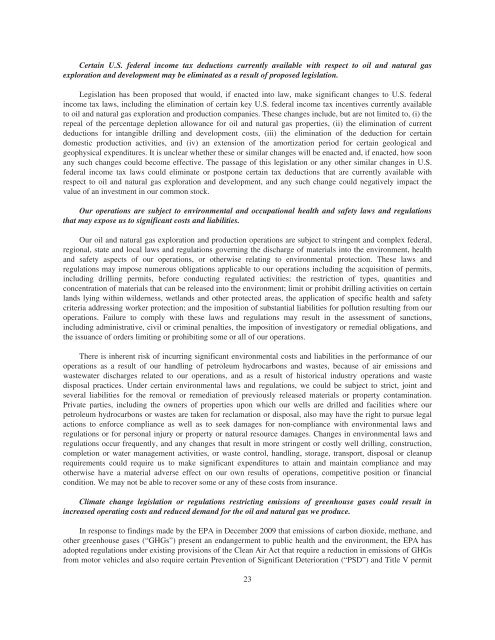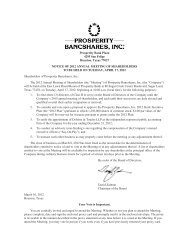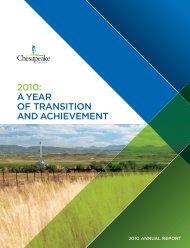goodrich petroleum corporation - RR DONNELLEY FINANCIAL
goodrich petroleum corporation - RR DONNELLEY FINANCIAL
goodrich petroleum corporation - RR DONNELLEY FINANCIAL
You also want an ePaper? Increase the reach of your titles
YUMPU automatically turns print PDFs into web optimized ePapers that Google loves.
Certain U.S. federal income tax deductions currently available with respect to oil and natural gas<br />
exploration and development may be eliminated as a result of proposed legislation.<br />
Legislation has been proposed that would, if enacted into law, make significant changes to U.S. federal<br />
income tax laws, including the elimination of certain key U.S. federal income tax incentives currently available<br />
to oil and natural gas exploration and production companies. These changes include, but are not limited to, (i) the<br />
repeal of the percentage depletion allowance for oil and natural gas properties, (ii) the elimination of current<br />
deductions for intangible drilling and development costs, (iii) the elimination of the deduction for certain<br />
domestic production activities, and (iv) an extension of the amortization period for certain geological and<br />
geophysical expenditures. It is unclear whether these or similar changes will be enacted and, if enacted, how soon<br />
any such changes could become effective. The passage of this legislation or any other similar changes in U.S.<br />
federal income tax laws could eliminate or postpone certain tax deductions that are currently available with<br />
respect to oil and natural gas exploration and development, and any such change could negatively impact the<br />
value of an investment in our common stock.<br />
Our operations are subject to environmental and occupational health and safety laws and regulations<br />
that may expose us to significant costs and liabilities.<br />
Our oil and natural gas exploration and production operations are subject to stringent and complex federal,<br />
regional, state and local laws and regulations governing the discharge of materials into the environment, health<br />
and safety aspects of our operations, or otherwise relating to environmental protection. These laws and<br />
regulations may impose numerous obligations applicable to our operations including the acquisition of permits,<br />
including drilling permits, before conducting regulated activities; the restriction of types, quantities and<br />
concentration of materials that can be released into the environment; limit or prohibit drilling activities on certain<br />
lands lying within wilderness, wetlands and other protected areas, the application of specific health and safety<br />
criteria addressing worker protection; and the imposition of substantial liabilities for pollution resulting from our<br />
operations. Failure to comply with these laws and regulations may result in the assessment of sanctions,<br />
including administrative, civil or criminal penalties, the imposition of investigatory or remedial obligations, and<br />
the issuance of orders limiting or prohibiting some or all of our operations.<br />
There is inherent risk of incurring significant environmental costs and liabilities in the performance of our<br />
operations as a result of our handling of <strong>petroleum</strong> hydrocarbons and wastes, because of air emissions and<br />
wastewater discharges related to our operations, and as a result of historical industry operations and waste<br />
disposal practices. Under certain environmental laws and regulations, we could be subject to strict, joint and<br />
several liabilities for the removal or remediation of previously released materials or property contamination.<br />
Private parties, including the owners of properties upon which our wells are drilled and facilities where our<br />
<strong>petroleum</strong> hydrocarbons or wastes are taken for reclamation or disposal, also may have the right to pursue legal<br />
actions to enforce compliance as well as to seek damages for non-compliance with environmental laws and<br />
regulations or for personal injury or property or natural resource damages. Changes in environmental laws and<br />
regulations occur frequently, and any changes that result in more stringent or costly well drilling, construction,<br />
completion or water management activities, or waste control, handling, storage, transport, disposal or cleanup<br />
requirements could require us to make significant expenditures to attain and maintain compliance and may<br />
otherwise have a material adverse effect on our own results of operations, competitive position or financial<br />
condition. We may not be able to recover some or any of these costs from insurance.<br />
Climate change legislation or regulations restricting emissions of greenhouse gases could result in<br />
increased operating costs and reduced demand for the oil and natural gas we produce.<br />
In response to findings made by the EPA in December 2009 that emissions of carbon dioxide, methane, and<br />
other greenhouse gases (“GHGs”) present an endangerment to public health and the environment, the EPA has<br />
adopted regulations under existing provisions of the Clean Air Act that require a reduction in emissions of GHGs<br />
from motor vehicles and also require certain Prevention of Significant Deterioration (“PSD”) and Title V permit<br />
23











